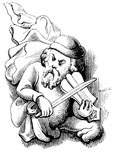
Why I Remain Seated When I Hear Handel’s Hallelujah Chorus
GUEST COLUMN
As we look forward to another Christmas season and to the public concerts that are so much a part of the holiday, we can expect that many of the musical programs will include the Hallelujah Chorus from Handel’s Messiah. For more than two centuries it has been customary for audiences to rise at the first notes of that piece, for reasons which few fully understand. It is my custom to remain seated during the Hallelujah Chorus, for reasons that are too important to keep to myself any longer.
It is generally well known that the custom of rising for the Hallelujah Chorus originated when the titular king of England, George II, rose from his seat during a performance of Messiah, presumably in tribute to the majesty of the music. Others in the audience rose to their feet too — not because the Spirit moved them, but because etiquette required everyone to rise whenever the king rose. Thus, from the very beginning, this peculiar social convention had little to do with music, and even less to do with theology. When people in our own times rise for the Hallelujah Chorus they pay tribute neither to Handel’s music nor to God, but to an English king who happened to stand up while the piece was being performed. But George II was not the real king of England, and therein lies my reason for keeping my seat while others in the audience rise to their feet with conspicuous self-satisfaction.
George II owed his job to events that occurred half a century earlier, when the English Parliament deposed James II, a convert to Catholicism who had succeeded to the throne in 1685. James was guilty of nothing more than the restoration of civic and religious equality to Roman Catholics, who had been persecuted in England in one form or another since the time of King Henry VIII; and the rabid opposition to James’s initiative toward religious toleration revealed the depth of anti-Catholic bigotry in the English consciousness.
In 1688 James’s wife gave birth to a son, who predictably would succeed his father and keep the English crown in the Catholic line. So James II was harried out of the country and replaced with politically acceptable Protestants imported from the Continent. In an effort to preclude the need for such coarse behavior in the future, Parliament passed the Act of Settlement in 1701, which excluded Roman Catholics from succession to the English throne.
You May Also Enjoy
There's a lot of debate about the music in Catholic parishes, including the words of hymns.
Pennsylvania built the first Catholic churches in the U.S., and its music gained renown even among non-Catholics.
Psalm tones were used in Jewish synagogues and may have been the model for the chant sung in the early Christian Church.

